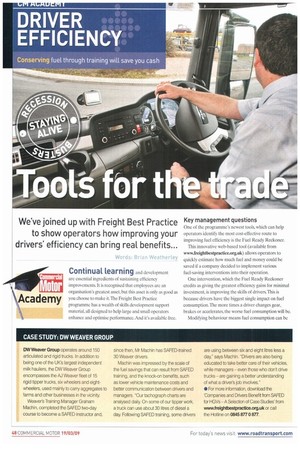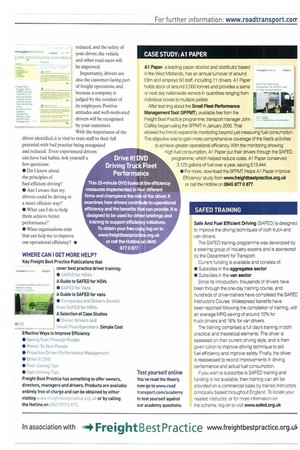We've joined up with Freight Best Practice to show operators how improving your drivers' efficiency can bring real benefits...
Page 48

Page 49

If you've noticed an error in this article please click here to report it so we can fix it.
Words: Brian Weather-Ley Continual learning and development are essential ingredients of sustaining efficiency improvements. It is recognised that employees are an organisation's greatest asset, but this asset is only as good as you choose to make it.The Freight Best Practice programme has a wealth of skills development support material, all designed to help large and small operators enhance and optimise performance. And its available free.
Key management questions
One of the programme's newest tools, which can help operators identify the most cost-effective route to improving fuel efficiency is the Fuel Ready Reckoner.
This innovative web-based tool (available from www.freightbestpractice.org.uk) allows operators to quickly estimate how much fuel and money could be saved if a company decided to implement various fuel-saving interventions into their operation.
One intervention, which the Fuel Ready Reckoner credits as giving the greatest efficiency gains for minimal investment, is improving the skills of drivers.This is because drivers have the biggest single impact on fuel consumption. The more times a driver changes gear, brakes or accelerates, the worse fuel consumption will be.
Modifying behaviour means fuel consumption can be reduced, and the safety of your driver, the vehicle and other road users will be improved.
Importantly, drivers are also the customer-facing part of freight operations, and, because a company is judged by the conduct of its employees. Positive attitudes and well-motivated drivers will be recognised by your customers.
With the importance of the driver identified, it is vital to train staff to their full potential with bad practice being recognised and reduced. Even experienced drivers can have bad habits. Ask yourself a few questions: • Do I know about the principles of fuel-efficient driving?
• Am I aware that my drivers could be driving in a more efficient way?
• What can I do to help them achieve better performance?
• What organisations exist that can help me to improve our operational efficiency? •
















































































































































